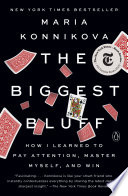

In 'The Biggest Bluff', Maria Konnikova explores the multifaceted nature of luck, emphasizing that while luck plays a role in outcomes, skill and decision-making are paramount in determining success. She illustrates that luck is not merely a random occurrence but is influenced by one's choices and actions. This idea is particularly relevant in high-stakes environments like poker, where players must navigate uncertainty and make calculated decisions. Konnikova argues that understanding the interplay between skill and luck can help individuals approach challenges in life and work with a more nuanced perspective. By recognizing that luck can be harnessed through informed decision-making, readers are encouraged to take control of their circumstances rather than attributing outcomes solely to chance.
Continue readingA significant theme in the book is the power of mindset in shaping outcomes. Konnikova discusses how a growth mindset—where one views challenges as opportunities for development—can lead to better performance in poker and life. She contrasts this with a fixed mindset, which hinders progress and adaptability. Through her journey in the world of poker, Konnikova illustrates that embracing challenges, learning from mistakes, and remaining open to feedback are critical to mastering any skill. This concept resonates beyond poker, applying to entrepreneurship, leadership, and personal growth, where resilience and adaptability are essential for success.
Continue readingThe book delves into the intricacies of decision-making, especially under conditions of uncertainty, a common scenario in both poker and business. Konnikova emphasizes the importance of analyzing available information, weighing risks, and making informed choices. She draws parallels between poker strategies and business strategies, highlighting how both require a keen understanding of probabilities and the ability to adapt quickly to changing circumstances. By mastering decision-making techniques in poker, Konnikova argues that individuals can enhance their capabilities in various domains, preparing them to navigate the complexities of life and work more effectively.
Continue readingKonnikova emphasizes that failure is an integral part of the learning process. In poker, as in life, setbacks can provide valuable insights and opportunities for growth. She shares her experiences of losing and the lessons learned from those moments, reinforcing the idea that failure should not be feared but embraced as a teacher. This perspective encourages readers to adopt a more resilient attitude towards challenges and failures, viewing them as stepping stones rather than obstacles. By fostering a culture of learning from failure, individuals can cultivate a mindset that promotes continuous improvement and innovation.
Continue readingEmotional intelligence plays a crucial role in poker, as it does in various aspects of life. Konnikova discusses how understanding one's emotions and the emotions of others can significantly impact decision-making and interpersonal relationships. In poker, reading opponents and managing one's own emotional responses can lead to better outcomes. This concept extends to leadership and teamwork, where emotional intelligence can enhance communication, collaboration, and conflict resolution. By developing emotional intelligence, individuals can improve their ability to navigate complex social dynamics and make more effective decisions.
Continue readingKonnikova explores the delicate balance between skill and chance in poker, illustrating that while skill can influence outcomes, chance remains an unpredictable factor. This idea challenges the notion that success is solely the result of hard work and talent. Instead, Konnikova posits that recognizing and accepting the role of chance can lead to greater resilience and adaptability. This perspective is particularly relevant in entrepreneurship and investing, where external factors can significantly impact outcomes. By understanding this intersection, individuals can develop strategies that account for both skill and chance, ultimately leading to more informed decision-making.
Continue readingThroughout 'The Biggest Bluff', Konnikova embarks on a journey of self-discovery, using poker as a lens to explore her own capabilities, biases, and motivations. This journey highlights the importance of self-awareness in personal and professional growth. By confronting her own limitations and embracing challenges, Konnikova illustrates that self-discovery is a continuous process that can lead to profound insights and transformation. This theme resonates with anyone seeking to understand themselves better and improve their performance in various aspects of life, encouraging readers to engage in their own journeys of self-exploration.
Continue readingThe reading time for The Biggest Bluff depends on the reader's pace. However, this concise book summary covers the 7 key ideas from The Biggest Bluff, allowing you to quickly understand the main concepts, insights, and practical applications in around 21 min.
The Biggest Bluff is definitely worth reading. The book covers essential topics including The Nature of Luck, The Importance of Mindset, Decision-Making Under Uncertainty, providing practical insights and actionable advice. Whether you read the full book or our concise summary, The Biggest Bluff delivers valuable knowledge that can help you improve your understanding and apply these concepts in your personal or professional life.
The Biggest Bluff was written by Maria Konnikova.
If you enjoyed The Biggest Bluff by Maria Konnikova and want to explore similar topics or deepen your understanding, we highly recommend these related book summaries:
These books cover related themes, complementary concepts, and will help you build upon the knowledge gained from The Biggest Bluff. Each of these summaries provides concise insights that can further enhance your understanding and practical application of the ideas presented in The Biggest Bluff.